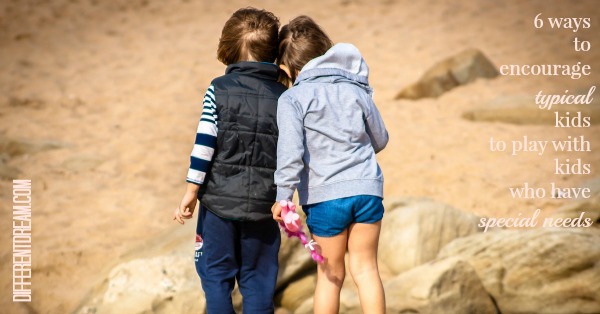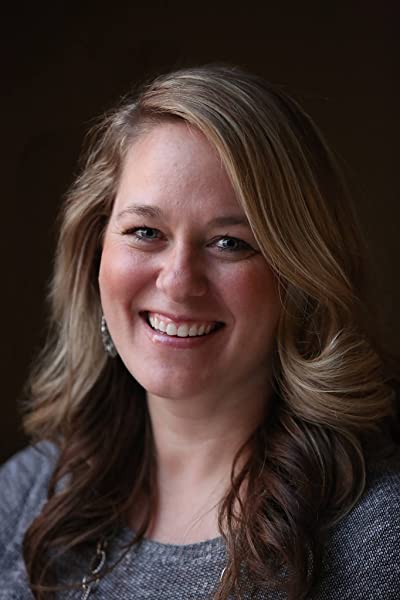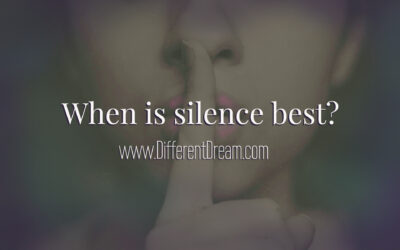Fostering Friendships for Kids with Special Needs, Pt. 2

Guest blogger Kimberly Drew is at Different Dream to finish up her series about fostering friendships for kids with special needs. In Part 1, she shared her thoughts on the importance of fostering friendships for kids with special needs. Today she offers six tips about how to intentionally encourage friendships between kids with special needs and their typical peers.
6 Ways to Teach Kids to Play with Your Child with Special Needs
In an effort to help create friendships with my daughter Abbey, I have been thinking about things I could have done differently to teach other children how to play with her when they were young. I wish I had taken these steps to advocate for her socially, and pray that you will benefit from this list.
- Communicate your heart’s desire with your friends who have children who are in your child’s peer group. If your close friends love you, as I’m sure they do, they want to know what’s in your heart and on your mind when it comes to your child. Be open about how isolating and difficult it can be to raise your child. Share with them your dreams for friendship and social interaction, and let them be a part of the team to make those dreams reality. Their children and families will get just as much out of it (and maybe even more) as yours will.
- Take the time to teach your friends about your child’s special nuances. You know how to handle your child’s drool or rough play, but that doesn’t mean that other adults do. Just because they love you and your child doesn’t mean they know what to do when your child is suddenly throwing a fit or having a melt-down. If they are prepared and fully informed, it will make it easier for their children to interact with your child, too. Teach them how to talk to your child. If your child uses a device, or sign language, or has certain key phrases they say when they want something, share those with your adult friends. If they can learn to communicate with your child appropriately, then they can model that for their children.
- Have your friends practice by role playing with their children. This is one of the best ways to teach young children how to handle themselves in new situations. Just like we teach our children what to do if a stranger tries to talk to them, we can teach them how to respond when a disabled child tries to grab them or hugs too hard. Offer to come over without your child to do this with them if they need help.
- Give other children some things they can say to your child. If your child is non-verbal, you have to help them learn how to have a “conversation” with your child when they are the only one talking. If your child can speak, tell them what they love to talk about.
- Set up play dates where your child can do something he or she loves and excels at. If your child loves movies, plan a movie night. Spend a few minutes before just socializing and practicing those skills that they role-played with their parents. If your child loves to paint, get out the supplies and paint together.
- Keep it short at first. An hour together is a great start and those times can build as the children grow more comfortable with each other.
Remember that the goal is to create lifelong friends and advocates for your child. We all need friends, and so does your child! It’s worth the work!
How Do You Foster Friendships for Kids with Special Needs?
Kim offered some great suggestions to foster friendships for kids with special needs. If you’ve discovered some great ways to promote friendships, share them in the comment box. We’d love to hear from you.
Do you like what you see at DifferentDream.com? You can receive more great content by subscribing to the quarterly Different Dream newsletter and signing up for the daily RSS feed delivered to your email inbox. You can sign up for the first in the pop up box and the second at the bottom of this page.

By Kimberly Drew
Kimberly grew up and went to college in the small town of Upland, IN. She graduated from Taylor University with a degree in Elementary Education in 2002. While at TU, she married her college sweetheart and so began their adventure! Ryan and Kimberly have four amazing kids on earth (Abigail, Jayden, Ellie, and Cooper), and a baby boy waiting for them in heaven. Their daughter Abigail (Abbey) has multiple disabilities including cerebral palsy, a seizure disorder, hearing loss, microcephaly, and oral dysphagia. She is the inspiration behind Kimberly’s desire to write. In addition to being a stay at home mom, Kimberly has been serving alongside her husband in full time youth ministry for almost fourteen years. She enjoys working with the senior high girls, scrapbooking, reading, and music. You can visit Kimberly at her website, Promises and Perspective.
1 Comment
Submit a Comment
Subscribe for Updates from Jolene
Related Posts
The Weight of Silence as Parents of Kids with Invisible Disabilities
Guest blogger Lisa Pelissier explains the weight of silence as parents of kids with invisible disabilities.
How to Build a Thriving Marriage as You Care for Children with Special Needs
Todd and Kristin Evans explain how to build a thriving marriage as you care for children with special needs.
How Do I Discern if Medication Is Best for my Child’s Behavioral Needs?
Heather Braucher explains her answer to the question, “How do I discern if medication is best for my child’s behavioral needs?”






Good advice! I like to think that most people want to include and interact with our special kids, but they need to know how in order to feel confidant in doing so. Thanks for sharing at Faith, Hope, and love.